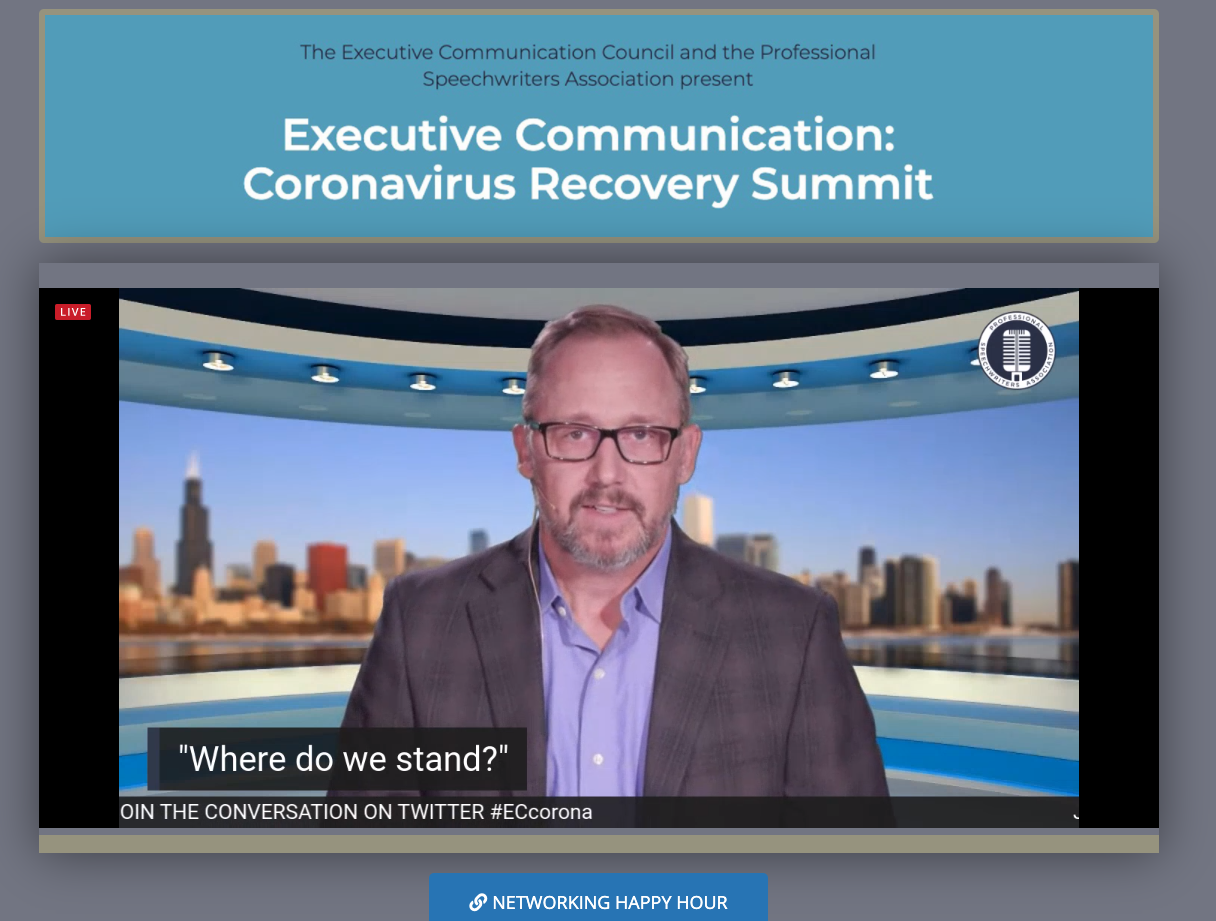Professional speechwriters, speaking privately
May 27, 2020
Straining to help leaders communicate via video, speechwriters sense: We are going to need more than this.
The conversation began with a constructive query in a private Google Group by a professional speechwriter looking for advice from his peers on how to help his client, an important official at a famous American institution, come across better on video.
The conversation turned quickly to a much larger problem in leadership communication during coronavirus.
“If there’s one thing I’ve discovered” as the coronavirus crisis has transformed all in-person public speaking to video chats, he said, “it’s that all of the worst possible remarks-based pitfalls are magnified on video. Didn’t practice enough? Check. Reading not speaking? Check. Poor eye contact? Check. Humor less effective with no audience? Check.”
Why are speaking problems magnified on video? “It’s much easier to cheat when you’re at the podium and the audience is twenty feet away. It’s less easy—or let’s face it damn near impossible—to do so on screen. The camera don’t lie.”
The speechwriter is learning how to direct his speaker to perform short parts of a speech, how to edit the excerpts into a coherent whole, add in supplemental footage to break up the monologue monotony. “With transitions! Hello iMovie!”
He and other speechwriters find themselves frantically fiddling with iPad and cell phone teleprompter apps—and contending with sound, lighting, composition and infinite other technical details that their training and experience never prepared them for. Suddenly the screenplay writer is also the director, costume designer and the key grip.
The speechwriter’s colleagues responded to his request for advice with suggestions—“we’ve noticed that if we are shooting too close, the ‘reading’ is more apparent”—and to his expression of frustration with feeling. One speechwriter said her client’s difficulty in carrying off a “heartfelt thank you” is “painfully obvious. I’m trying not to be overly critical but I also want it to be good.”
Other speechwriters lamented that their clients, chronically too busy to practice their speeches, are even busier now, and even less likely to go over scripts in advance. And pulled out of their own comfort zones in every direction, many leaders are clinging to old-school techniques, like the captain of another major American institution who rejects the teleprompter and “has his wife hold up each sheet, which makes for some awkward pauses,” his speechwriter said.
The coronavirus crisis has made one speechwriter’s client more compelling. “I’ve been more successful in getting her to show a little vulnerability and share some personal stories in our regular written updates during this crisis, and there has been a tremendously positive response to that,” the speechwriter said, “She is naturally a very guarded person, so this was a big breakthrough.”
So speechwriters are working the problem the best they can (and working harder than they ever have). And truth is, they should have begun years ago learning how to help present their speakers via video, in order reach audiences they can’t speak to personally. If they had, they wouldn’t be caught so flat-footed now. But they’ll catch up, and video leadership communication will get better, one speechwriter and speaker at a time.
But there’s a deeper problem, and a more fundamental lament. “The power of a speech, like theatre, has so much to do with physical presence in shared space,” said one speechwriter. “Besides the technical problems, scaling back tone and rhythms to a conversational mode is its own challenge that I am trying, without much success, to find interesting!”
Creating sincere-seeming, authentic-ish videos isn’t what makes speechwriters tick, or what they get paid for. “As soon as [my client] looks into the camera and says ‘Hi everyone, I hope you’re all doing well…’ I cringe, even though it’s 100% sincere,” another speechwriter says. Why? “It’s this strained sincerity-across-distance business that I can’t handle, because it accepts an impoverished vision of what human relationships are about. I know why we have to do it. But, as a speechwriter, relying on the format requires giving up (temporarily, I hope) on so much of what I value in our work!”
Just so. And the day speechwriters stop agonizing about the loss of the physical presence, shared space, and human relationships is the day they need to start calling themselves something other than speechwriters.
“Speeches are more popular and relevant than ever,” wrote the amazingly named Australian speechwriter Lucinda Holdforth in her book Leading Lines, which came out in America just as coronavirus did. “In our isolated world there’s rough magic in the communal experience. We come together to breathe in tandem, to experience our own responses alongside each other and, if the speaker speaks truly, in deep connection with one another.”
We’ll find a way to make those deep connections again.
Because we have to.



